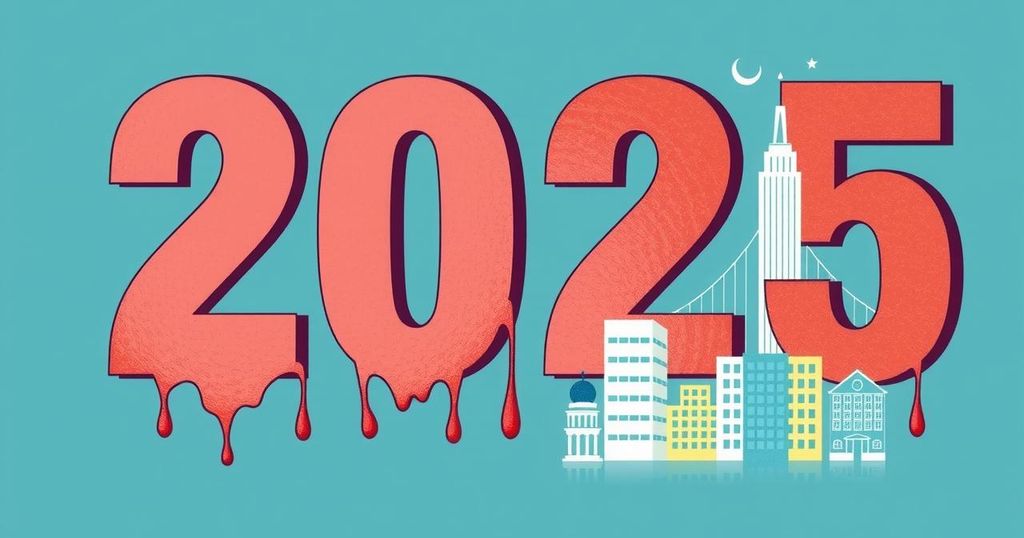Global Perspectives Heading into 2025: Inflation, AI Fears, and Climate Change Challenges

As we approach 2025, concerns over inflation, AI-related job losses, climate change, and immigration shape public sentiment. A recent survey shows a slight increase in optimism, with 71% expecting improvements in the coming year. Despite economic anxieties, there are signs of resilience amid challenges, particularly around perceptions of inflation and immigration expectations.
Concerns regarding inflation, artificial intelligence-driven job losses, climate change, and immigration are predominant as we approach 2025. However, a cautious optimism is emerging among global populations. A recent survey across 33 countries indicates that 71% of respondents anticipate an improvement in the coming year, reflecting a slight increase compared to 2024. Central to shaping these perspectives are themes of economic stability, societal anxieties, and technological advancements.
The survey, which engaged 23,721 adults from October 25 to November 8, underscores a subtle shift in attitudes. Notably, fewer respondents characterize the past year negatively; 51% described 2024 as challenging for their families, a decline from 53% in 2023, while 65% viewed it as a poor year for their countries, down from 70%. These findings suggest resilience amidst challenges and a burgeoning hope for improvement.
Regarding economic concerns for 2025, inflation remains a major issue, with 79% of participants expecting prices to outpace income growth. Moreover, 74% anticipate tax increases, highlighting ongoing financial worries. Interestingly, expectations of rising interest rates have decreased, indicating a possible easing of monetary policies by central banks. For the Latino community in the U.S., anxieties about rising costs and job security resonate deeply, with 65% fearing job displacement by AI, although 43% acknowledge its potential to generate new opportunities.
In Latin America, economic concerns mirror global sentiments, with inflation and unemployment as primary worries. Nations such as Brazil, Mexico, and Argentina are particularly affected, with citizens expressing cautious optimism regarding potential economic stabilization despite ongoing challenges.
The perception of immigration remains contentious, with 67% of respondents expecting an increase in migration in 2025. This figure represents a slight decrease from 2024, yet anxiety regarding immigration continues to dominate, often driven more by societal concerns and political narratives than actual migration statistics. Countries like Turkey (84%) and Spain (80%) foresee significant rises in immigration, contrasting with lower expectations in the U.S. (56%) and Canada (55%).
Technological advancements provoke mixed feelings; while many anticipate job losses due to AI, there is optimism about innovations in fields like healthcare, with 40% expressing hope for breakthroughs like a cure for cancer. Environmental anxieties remain prevalent, with 80% predicting increased global temperatures and 72% foreseeing more extreme weather events. However, confidence in governmental actions to combat climate change seems to be waning, as only 52% now expect stricter carbon emission targets, a decline of 3 percentage points from the previous year.
The article discusses the prevailing global concerns as we approach 2025, such as inflation, job losses due to artificial intelligence advancements, climate change impacts, and immigration trends. It highlights a survey conducted in 33 countries that reveals the public’s cautious optimism about the forthcoming year despite recent economic and social challenges. The background contextualizes the disparities in perceptions around these themes, particularly in the face of technological and environmental developments, and reflects on the broader implications for society and economies at large.
In summary, while concerns about inflation, job security from AI advancements, climate change, and immigration intensify globally, there is a tentative optimism among individuals looking towards 2025. The survey indicates a decline in negative perceptions about the past year and highlights important economic anxieties, particularly regarding inflation and job displacement. As we navigate these complex issues, the evolving attitudes toward technology and the environment will significantly influence future societal and economic stability.
Original Source: www.latintimes.com








